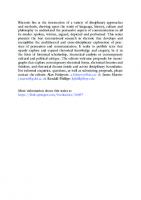Ambiguities of Domination: Politics, Rhetoric, and Symbols in Contemporary Syria 0226877876, 0226877884, 4319993209, 9780226877877, 9780226125701, 022612570X
In Syria, the image of President Hafiz al-Asad is everywhere. In newspapers, on television, and during orchestrated spec
260 29 9MB
English Pages 200 [129] Year 1999;2000
Recommend Papers

File loading please wait...
Citation preview
...., ...,
...,
;:
= "" = == '" =
=- "" ...... "'"
""=
""' "" ...., "'=" ....
....
= = =
...... ....
-. =
~
"'"(
-. -'" -. ~
..c::;
c:::::I
c:::::I
"'"(
~
== =-
'"
ac::::r' ......
..c::;
~
~
~
=
~
......
c:::::I
--.-. "'C:I
~
..c::;
"'"(
~
"'"(
c:::::I
"=
a
~
......
c:::::I
~
=
LISA WEDEEN is assistant professor of political science at the University of Chicago. The University of Chicago Press, Chicago 60637 The University of Chicago Press, Ltd., London © 1999 by The University of Chicago All rights reserved. Published 1999 08 07 06 05 04 03 02 01 00 99 1 2 3 4 5
CONTENTS
Acknowledgments A Note on Transliteration
ISBN: 0-226-87787-6 (cloth) ISBN: 0-226-87788-4 (paper) Library of Congress Cataloging-in-Publication Data Wedeen, Lisa. Ambiguities of domination: politics, rhetoric, and symbols in contemporary Syria / Lisa Wedeen. p. cm. Includes bibliographical references and index. ISBN 0-226-87787-6 (alk. paper) ISBN 0-226-87788-4 (pbk. : alk. paper) 1. Symbolism in politics-Syria. 2. Rhetoric-Political aspectsSyria. 3. Syria-Politics and government-1971- 4. Assad, Hafez, 1928- 5. Political culture-Syria. 6. Public opinion-Syria. I. Title. DS98.4.W43 1999 320.95691-dc21 98-46430 CIP The paper used in this publication meets the minimum requirements of the American National Standard for Information Sciences-Permanence of Paper for Printed Library Materials, ANSI Z39.48-1992.
1. BELIEVING IN SPECTACLES
VII
Xl
1
2. KILLING POLITICS: OFFICIAL RHETORIC AND PERMISSIBLE SPEECH
32
3. ACTING "As IF " : THE STORY OF M
67
4. SIGNS OF TRANSGRESSION
87
5. COMPLICATING COMPLIANCE
143
Notes
161
Bibliography
211
Index
231
ACKNOWLEDGMENTS
This work would not have been possible without the assistance of many Syrians whose names must go unmentioned. The hospitality shown to me by my hosts made my years of field work remarkably pleasurable. In particular, I thank my longtime friends who shared their experiences, introduced me to their friends, and encouraged me in my intellectual concerns. Syrians taught me what I know about Syria. They helped me to think about power and official rhetoric in ways that allowed me to question some of the abiding assumptions and underlying concepts of social science. Although official interviews were an important part of this learning process, it was really the events of everyday life, the periods of "hanging" out-of drinking coffee, studying at the university, teaching exercise classes, making olives, babysitting, hosting salon-like gatherings in my home, going to films, shopping for groceries, riding the bus with friends to visit relatives in faraway places-that produced the chance encounters and enduring connections that animate this book. Many people have earned my gratitude for their intellectual support. Hanna Pitkin's love for and precision with language has had a lasting impact on the way in which I think and write about the world. For her careful, critical readings of many drafts, I am particularly appreciative. Laura Green's invaluable comments on several versions of the book reinforce my admiration for her acuity, wit, and eloquence. I would also like to thank my colleagues at the University of Chicago who helped me to transform the dissertation into a book. Specifically, the members of the Wilder House
I
VIZ
VlZt
ACKNOWLEDGMENTS
Editorial Board and audiences at many workshops offered insightful suggestions that helped to make the metamorphosis possible. For incisive readings of all or parts of the book at various stages of its development, I am indebted to Lila Abu-Lughod, Andrew Apter, Nadia Abu el-Haj, Lauren Berlant, Robin Derby, Gaston' Alonso Donate, James Fearon, Debbie Gould, John Mark Hansen, Gary Herrigel, Ken Jowitt, David Laitin, Ira Lapidus, Zachary Lockman, Volker Perthes, Karen Pilkington, Moishe Postone, Michael Rogin, Lynn Sanders, William H. SewellJr., and Robert Vitalis. Joseph Logan was a fine research assistant. Engseng Ho's erudition made the process of reviewing transliterations more delightful than it otherwise would have been. Earlier versions of chapter 3 were presented at the 1995 annual meeting of the American Political Science Association, at the Massachusetts Institute of Technology, the University of California at Berkeley, the University of Chicago, New York University, and Wesleyan University. I am grateful to those audiences for their comments. I would especially like to thank the anonymous reviewers at Comparative Studies in Society and History for their critical readings. James Schaefer's editorial assistance and permission to reprint a slightly different version of chapter 3 here are appreciated. I would also like to thank the staffs at the Asad library and at the Institut Fran


![Corporate Power and Ownership in Contemporary Capitalism: The Politics of Resistance and Domination [1 ed.]
041546787X, 9780415467872](https://ebin.pub/img/200x200/corporate-power-and-ownership-in-contemporary-capitalism-the-politics-of-resistance-and-domination-1nbsped-041546787x-9780415467872.jpg)

![Symbolic Domination: Cultural Symbols and Historical Change in Morocco [Hardcover ed.]
0226701484, 9780226701486](https://ebin.pub/img/200x200/symbolic-domination-cultural-symbols-and-historical-change-in-morocco-hardcovernbsped-0226701484-9780226701486.jpg)




